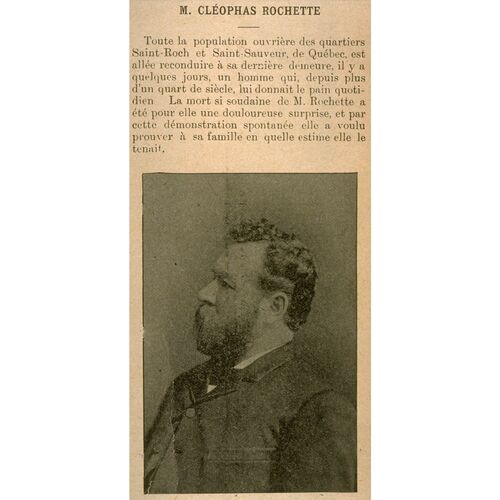ROCHETTE, CLÉOPHAS, businessman and politician; b. c. 1843, probably in Pointe-aux-Trembles (Neuville), Lower Canada, son of Olivier Rochette and Rose Laliberté; m. Malvina Brulotte, and they had seven children; d. 22 Oct. 1895 at Quebec.
Cléophas Rochette came to live at Quebec when he was about 20. Like his brothers, Gaspard and Olivier, he established himself on Rue Saint-Vallier and went into the tanning business. In 1871 his tannery turned out $25,000 worth of hides and employed 13 workers. His output hardly stands comparison with the figures attained by the five leading Quebec tanners, which at that time ranged from $41,600 to $64,000.
In the autumn of 1875 Rochette bought the tannery of John Rochette (also called Jean-Baptiste or Jean-Michel), one of the city’s major tanners, who had fallen victim to the prevailing economic depression and had gone into bankruptcy. Production was concentrated in a three-storey building on Rue Saint-Vallier, which served as the main store, and in some sheds and a second building that housed a ten-horsepower steam-engine on Rue Demers, in Saint-Sauveur. The machinery that Cléophas Rochette used was certainly unsophisticated. In addition to the steam-engine he had a tanning mill, a stitching table with four rollers, two stoves, and tools for cutting and dehairing. The land, buildings, and equipment had cost him $2,000, a sum lent him by his brother Gaspard.
Rochette at this time specialized in one of the secondary sectors of the boot and shoe industry, making insoles, toe-caps, and heels. In the 1880s he became one of the leaders in this sector, as did the Montreal branch of H. J. Fisk and Company, which had gone into business at Quebec during this period. The two companies were in competition for the local market, but neither apparently suffered since in 1891 they showed capitalizations estimated at between $20,000 and $35,000. Rochette’s presence on the Montreal market seems to have been insignificant; it was limited to merchandise worth about $1,200 on consignment with a leather merchant. In effect, his products were sold only at Quebec. His sources of supply were just as restricted. He obtained scraps of leather from Ontario, but his main suppliers remained his brother Gaspard and other Quebec tanners and curriers.
Rochette was a minor industrialist who secured short-term financing through bills of exchange drawn upon Gaspard, Félix Goudreau, and François-Xavier Drolet*. These bills, rarely exceeding $400, enabled him to purchase raw materials and pay for the technological innovations devised by him and fabricated by Drolet or by other companies with machinists. Larger sums seem to have been supplied by Gaspard by the same procedure. Between July and October 1895, for example, he endorsed and guaranteed bills of exchange for nearly $13,200.
In 1887 Rochette diversified his activities by buying a brickyard, which was equipped with a steam-engine with boiler, driving shafts, and pulleys. Two brick-presses, a stamping-press, various moulds, water-pipes, wheelbarrows, carts, and sleds completed the equipment needed. Sales outlets were confined to the local market.
Rochette seems to have been a dynamic businessman operating on a modest scale. At his death his factory had machinery for making insoles, toe-caps, and heels that was valued at $5,590. The two steam-engines and the boilers represented about 30 per cent of the capital assets, the remainder being made up of various mechanical tools, in particular six hydraulic presses and a pump. The inventory of his brickyard, 1,800,000 bricks, was estimated to be worth $7,200. His investments and bank holdings did not amount to much: he had only $57 in two savings accounts, and stocks and shares of little value. He owned two $50 shares in a butter factory at Cap-Santé, four $5 shares in an athletic society at Saint-Roch, and a $100 share in a company for breeding horses. He had also invested $125 in an oyster-farming company. In fact, the only valuable movables were three insurance policies amounting to $20,000.
Cléophas Rochette none the less was part of the élite in Saint-Sauveur. He sat on the municipal council for a number of years. He even succeeded in negotiating an exemption from municipal taxes for his firm shortly before Saint-Sauveur was annexed to Quebec. This agreement was extended, moreover, for four years (1889–93) and appeared in the terms of annexation arrived at in 1889. The transformation of the village into a city ward, however, spelt the end of his political career. It is clear that he was squeezed out of what was one of his only spheres of influence.
AC, Québec, Minutiers, Joseph Savard, 2 nov. 1875. ANQ-Q, CE1-1, 25 nov. 1834; CE1-22, 28 oct. 1861, 10 juin 1862, 25 oct. 1895. AVQ, Annexion Saint-Sauveur, 1855–89, conseil, procès-verbaux, 5 oct. 1885; 22 août 1886; 14 oct., 5 déc. 1887; secrétaire trésorier, 5 avril, 15 juin 1887; 11 mars, 5 avril 1889; Conseil, conseil de ville, règlements de la ville, no.286, article 19, 30 août 1889. BE, Québec, reg. B, 103, no.45983; 106, no.48120; 130, no.61666; 180, no.95356. L’Événement, 22 oct. 1895. La Presse, 23 oct. 1895. Quebec directory, 1862–67. Jean Benoit, “Le développement des mécanismes de crédit et la croissance économique d’une communauté d’affaires; les marchands et les industriels de la ville de Québec au XIXe siècle” (thèse de phd, univ. Laval, Québec, 1986).
Cite This Article
Jean Benoit, “ROCHETTE, CLÉOPHAS,” in Dictionary of Canadian Biography, vol. 12, University of Toronto/Université Laval, 2003–, accessed December 31, 2025, https://www.biographi.ca/en/bio/rochette_cleophas_12E.html.
The citation above shows the format for footnotes and endnotes according to the Chicago manual of style (16th edition). Information to be used in other citation formats:
| Permalink: | https://www.biographi.ca/en/bio/rochette_cleophas_12E.html |
| Author of Article: | Jean Benoit |
| Title of Article: | ROCHETTE, CLÉOPHAS |
| Publication Name: | Dictionary of Canadian Biography, vol. 12 |
| Publisher: | University of Toronto/Université Laval |
| Year of publication: | 1990 |
| Year of revision: | 1990 |
| Access Date: | December 31, 2025 |


![M. Cléophas Rochette [image fixe] Original title: M. Cléophas Rochette [image fixe]](/bioimages/w600.5719.jpg)

